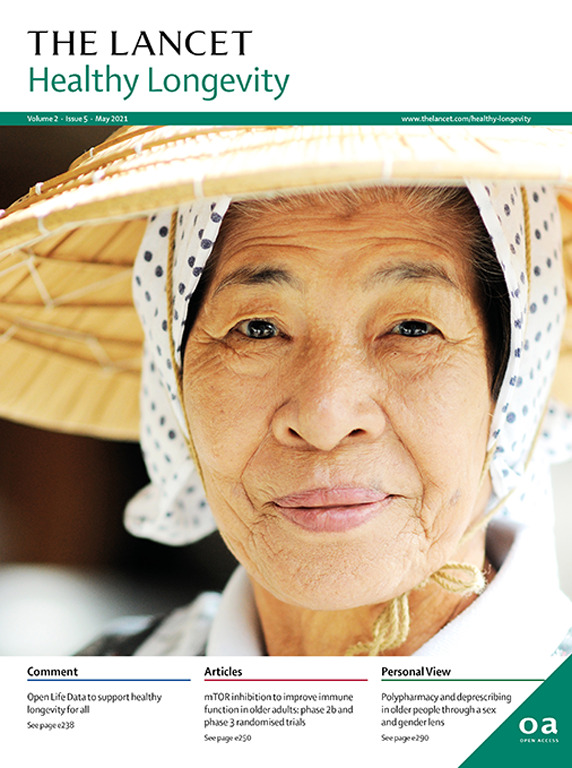爱尔兰老年人在医院急诊就医期间接受由老年病学专家主导的多学科综合评估进行虚弱筛查(SOLAR):随机对照试验。
IF 14.6
Q1 GERIATRICS & GERONTOLOGY
引用次数: 0
摘要
背景:多学科综合老年评估(CGA)可改善住院老年人的预后,但有关其在急诊科有效性的证据却很有限。我们旨在评估 CGA 在急诊科对体弱老年人的益处:在这项随机对照试验中,我们招募了在利默里克大学医院(爱尔兰利默里克)急诊科就诊的老年人(≥75 岁)。参与者在 "高危老年人识别 "筛查工具中筛查出体弱(得分≥2)。需要抢救的患者以及有 COVID-19、精神病、手术或外伤主诉的患者被排除在外。参与者按 1:1 的比例随机分配到由老年病学专家主导的多学科 CGA 和管理或常规护理中。疗效评估人员对治疗分配进行了屏蔽。主要疗效结果是在急诊科花费的时间,即在意向治疗人群中,从计算机数据库登记到出院或入住住院病房的时间。该研究已在ClinicalTrials.gov网站注册,编号为NCT04629690:在 2020 年 11 月 9 日至 2021 年 5 月 13 日期间,我们招募了 228 名患者。干预组有 113 人(平均年龄 82-4 岁 [SD 4-9];女性 63 [56%];爱尔兰白人 113 [100%]),对照组有 115 人(83-1 [5-6];61 [53%];112 [97%])。干预组在急诊科的中位时间为 11-5 小时(IQR 5-27),对照组为 20 小时(7-29)(中位数差异 [Hodges-Lehmann 估计器] 3-1 小时 [95% CI 0-6-7-5];P=0-013)。没有发生与干预相关的不良事件:老年病学家主导的对体弱老年人的多学科评估与减少急诊科就诊时间、降低入住疗养院的比例、提高生活质量以及降低30天和180天的功能下降有关。需要进行多中心试验来确认研究结果的外部有效性。这项研究为在急诊科环境中建立类似的团队提供了证据基础:卫生研究委员会(ILP-HSR-2017-014)。本文章由计算机程序翻译,如有差异,请以英文原文为准。
Frailty screening with comprehensive geriatrician-led multidisciplinary assessment for older adults during emergency hospital attendance in Ireland (SOLAR): a randomised controlled trial
Background
Multidisciplinary comprehensive geriatric assessment (CGA) improves outcomes in hospitalised older adults but there is limited evidence on its effectiveness in the emergency department. We aimed to assess the benefits of CGA in the emergency department for older adults living with frailty.
Methods
In this randomised controlled trial, we enrolled older adults (≥75 years) who presented to the emergency department with medical complaints at University Hospital Limerick (Limerick, Ireland). Participants screened positive for frailty on the Identification of Seniors at Risk screening tool (score ≥2). Patients requiring resuscitation as well as those with COVID-19, psychiatric, surgical, or trauma complaints were excluded. Participants were randomly allocated 1:1 to geriatrician-led multidisciplinary CGA and management or usual care. Outcome assessors were masked to treatment allocation. The primary efficacy outcome was time spent in the emergency department, defined as the time from registration on the computer database until time of discharge or admission to an inpatient ward in the intention-to-treat population. This study is registered with ClinicalTrials.gov, NCT04629690.
Findings
Between Nov 9, 2020, and May 13, 2021, we recruited 228 patients. 113 participants were included in the intervention group (mean age 82·4 years [SD 4·9]; 63 [56%] women; 113 [100%] White Irish) and 115 in the control group (83·1 [5·6]; 61 [53%]; 112 [97%]). Median time in the emergency department was 11·5 h (IQR 5–27) in the intervention group and 20 h (7–29) in the control group (median difference [Hodges–Lehmann estimator] 3·1 h [95% CI 0·6–7·5]; p=0·013). There were no adverse events related to the intervention.
Interpretation
Geriatrician-led multidisciplinary assessment of older adults living with frailty was associated with reduced time spent in the emergency department setting at index visit and lower rates of nursing home admission, greater increases in quality of life, and lower decreases in function at both 30 days and 180 days. Multicentre trials are needed to confirm the external validity of the findings. This study provides an evidence base for similar teams in an emergency department setting.
Funding
Health Research Board (ILP-HSR-2017–014).
求助全文
通过发布文献求助,成功后即可免费获取论文全文。
去求助
来源期刊

Lancet Healthy Longevity
GERIATRICS & GERONTOLOGY-
CiteScore
16.30
自引率
2.30%
发文量
192
审稿时长
12 weeks
期刊介绍:
The Lancet Healthy Longevity, a gold open-access journal, focuses on clinically-relevant longevity and healthy aging research. It covers early-stage clinical research on aging mechanisms, epidemiological studies, and societal research on changing populations. The journal includes clinical trials across disciplines, particularly in gerontology and age-specific clinical guidelines. In line with the Lancet family tradition, it advocates for the rights of all to healthy lives, emphasizing original research likely to impact clinical practice or thinking. Clinical and policy reviews also contribute to shaping the discourse in this rapidly growing discipline.
 求助内容:
求助内容: 应助结果提醒方式:
应助结果提醒方式:


